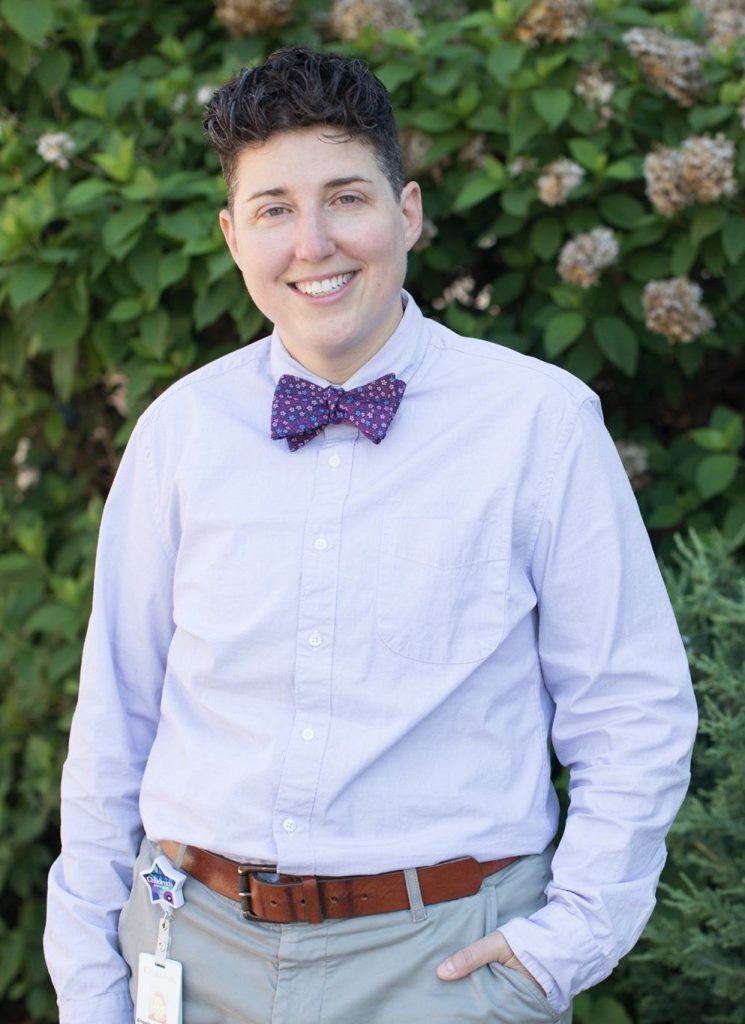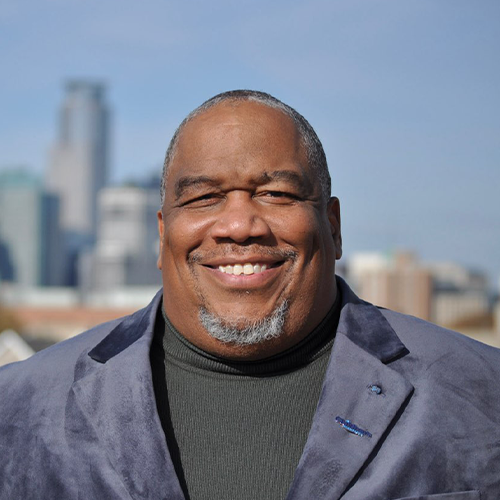

Even “experts” make mistakes. The important thing is how we handle them.
Two of our kid experts discuss common mistakes related to different aspects of identity – mistakes they’ve seen others make, and mistakes they’ve made themselves.
Dr. Angela Kade Goepferd (AKG) (they/she) is the chief education officer, chief of staff and medical director of the Gender Health program at Children’s Minnesota.
James Burroughs (JB) (he/him) is the senior vice president of government and community relations, and chief equity and inclusion officer at Children’s Minnesota.
Do you need to label?
JB: I’ve made some mistakes along the way as far as my interactions with you, Angela. And I know you’d say you’ve learned some things from me about race, equity, what to say and not to say. We’re both still learning.
The other day someone was asking a friend of mine, “What do people prefer? Black or African American?” Either one of those is fine with me and typically in our community, folks are fine either way.
But I’m also thinking, just call people, people. You don’t have to always put a label in front of them. If you do need to identify them, then yes, ask people what they want to be called. When you say Latino, what do you mean? I have Puerto Rican friends, Dominican friends, Cuban friends, Venezuelan friends, you name it. When you say Black, you may have African friends, friends who are Latino and Black, and also African American friends. There are lots of Native American tribes. How you approach the Dakota may be different than how you approach the Lakota. I think sometimes we categorize too broadly when we can dig deeper and ask, who is the community we really want to talk to?
Not everyone shares our experience
AKG: Mistakes I’ve made include assuming that my experience is representative. As a white person, so much of what I see reflected around me is my own experience, and then I can wrongfully assume that it’s someone else’s experience as well.
When I was first working at the primary care clinic in Minneapolis, I was talking with some of the MA staff, several of whom were Asian American or African American. We were talking about my weekend and how I had gone up North. I was talking to them like, you know how it is when you go up north. One of the Black medical assistants looked at me and said, “That is such a white people thing to do.” In that moment I thought, oh my gosh, it is. I was mistakenly assuming that my personal experience was a human experience that everyone shared.
When we assume that everyone else’s experience is like ours, we can end up making mistakes that hurt people’s feelings or offends them.
Affinity vs. allyship
JB: Some other mistakes I’ve seen — assuming that all poor people are Black or Latino. Some organizations say we’re going to help “underserved people.” Do they really mean they’re going to help more Black and Latino people? Or do they mean they’re going to help underserved people, which also includes lots of white people in Minnesota? There are more white people, population-wise, who are underserved in our area than there are Black and Latino. I see people avoid using language that describes what they really mean.
Sometimes when people meet me, they identify all the Black friends they’ve had in their life. Or they ask if I happen to know the other five Black people they know. Knowing me, I probably do. But it doesn’t make any difference to the conversation we’re having. You don’t have to shore up your Black list.
When I talk to Angela, I don’t need to say, “Hey, did you know, I know some gay folks in the community, too? They know me and can vouch for me.” I think some people say things like that because they think, “James is going to validate me if I say I know these cool Black people that he knows.” I think some do it because they’re nervous to have a discussion about race issues. They think, “I’m not racist. I can’t say racist stuff because I’ve known Josie Johnson since the ‘60s.”
AKG: If someone tells me, “My cousin’s gay or I know this person who’s gay,” I think they’re trying to tell me that they’re an LGBTQ ally and they want me to know that they love and support me and my community. But I would just rather hear that. Not use affinity as a sort of stand in for allyship.
I don’t want to speak for you, James, but I think it would mean a lot more for me to show up as an ally by giving vocal support to an issue that’s impacting the Black community then for me to tell you I have five Black friends.
JB: I like that, Angela, because I tell my friends who are allies in different areas, “You don’t get to determine whether you’re an ally or not. The person who’s in the group gets to determine that by your actions.” Just do what you’re going to do: be supportive vocally, financially, show up at meetings, etc., and then you’re showing your allyship.
Solving problems
JB: I think another mistake people make is asking a group to solve a problem they didn’t create. For example, when a white supremacist attacks Asian Americans, we shouldn’t go to our Asian Employee Resource Group (at Children’s Minnesota) and ask, how do we solve this?
Instead of asking them to do the work, we need to bring an idea forth, try something on your own, and then ask how they may want to partner on a solution. I see that quite often. People want people in the targeted community to be the only solver of the problem.
Trust is earned
AKG: One last point. Most people want you to trust them, right? But trust is earned. I’ll trust you as someone who’s safe for me, my kids and my community if you show me that. People from a majority group, whether it’s white people, straight people, whatever, want to be trusted because they know who they are on the inside. But for people who’ve been discriminated against or treated differently, that trust really does have to be earned.
JB: That’s very important, because that trust will then allow you to make mistakes; especially if you’ve built up a trust account like Stephen Covey talks about in his book. If you don’t have a trust account filled up with someone, your mistake is a heavy withdrawal.
AKG: Agreed. We all make mistakes. We’re all imperfect. Our brains are wired for bias, so we take shortcuts all the time that lead us to making mistakes. But if you take the time to learn and understand a community and build trust with its members, when you do make a mistake, there will likely be more leeway because you’ve done that work up front.
Note: Did you miss Part 1 of this blog? Here’s a link.

Dr. Kade Goepferd, (they/them)
Chief education officer and medical director of the Gender Health program
Dr. Kade Goepferd, (they/them), is the chief education officer, pediatrician and medical director of the Gender Health program at Children’s Minnesota. Dr. Goepferd is an advocate for advancing equitable health care for all children – including trans and gender-diverse youth. They have been named a Top Doctor by both Minneapolis/St. Paul Magazine and Minnesota Monthly for the last several years and gave their first TED talk, “The Revolutionary Truth about Kids and Gender Identity” at TEDx Minneapolis in 2020.
Follow me on Twitter, LinkedIn and Instagram.
